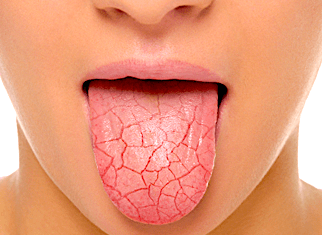Dry Mouth
The Importance of Saliva
The importance of saliva cannot be underestimated with a normal range of production of approximately 0.5-1.0 L per day it is important not only for teeth, but also protection from microbes, and aiding in digestion.
Quick Facts:
- Salvia Protects Against Bacteria (Microbes)
- Anti-bacterial
- Anti-fungal
- Anti-viral
- Saliva Protects The Teeth
- Slows tooth damage (demineralization)
- Promotes healing the teeth (remineralization)
- Lubrication, viscoelasticity for the tissues
- Buffering stops any acidic damage for example from juices
- Helps to Digest Food
- Helps With Tasting Food
Interesting Things To Know About Saliva
- Did you know? The normal flow rates of saliva change throughout the day (circadian rhythm), with often the highest production being in the mid-afternoon. This production can also be altered by food, thoughts and stimuli.
- Did you know? That the resting rate of saliva is typically 0.3-0.4 ml/min; whereas stimulated saliva flow (during eating) is about 1.6ml/min.
What Is The Cause Of Dry Mouth?
There may be many reasons to account for a decreased production of saliva.
1) Dehydration
- Even healthy individuals may become dehydrated at times, and as a result be susceptible to decay. For example, strenuous physical activity, outdoor occupations and alcohol consumption may all decrease saliva production.
2) Salivary gland pathology
- In cases of certain medical conditions patients radiotherapy and chemotherapy can cause temporary and permanent damage to saliva production
- Auto-immune diseases such as Sjogrens syndrome
3) Medical conditions
- Psychological stress – can reduce saliva rate
- Renal disease
4) Recreational drugs
- Drug users can be particularly at risk as drugs can impede and decrease the production
5) Medications
- Numerous medications can cause a temporary or permanent decreased production in saliva.
- Antidepressant, antihypertensive, and antipsychotics to name a few.
How Do You Test Saliva? What Is A Normal Range?
Current modes of testing saliva aim to access both the quality and quantity of saliva, through a number of clinical tests.
- Hydration levels -> This test involves checking the soft tissues.
- Visual appearance of the saliva -> Generally saliva appearing as a watery or clear fluid is often associated with health; whereas frothy or sticky saliva may signify decreased production.
- pH of the saliva -> This test checks the relative acidity of the saliva.
- Flow Rate and Time -> A test to determine how much saliva is produced in a certain period of time.
- Buffering capacity -> This checks the ability of saliva to counter any acidic challenge.
Managing Dry Mouth
Methods of promoting salivary deficiency:
- Ensuring adequate hydration – Drinking adequate amounts of water.
- Promote salivary gland function – Chewing (Gum)
- Control oral acidity – Erosion, sensitivity, caries – Tooth Mousse, bicarbonate mouth rinses.
- Promote remineralisation – Fluoride Toothpaste, Tooth Mousse, Dry Mouth Creams GC Mouth Cream
- Oral hygiene – Brushing, Flossing
- Avoid Sugarless Sweets
If you wish for more information on Dry Mouth or have any concerns please do not hesitate to contact Skygate Dental today on (07) 3114 1199 or 0406 579 197.


